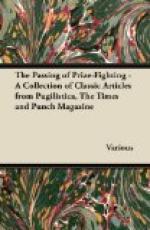The youth in the Stalls, fresh from college or school, will be about as much equal to the translation offhand as is young Sir Lucian Brent when asked by Mr. CATHCART to give the meaning of the Latin on the ancient brasses in the old church, and they won’t thank you for bringing school studies into playtime. On the whole, nothing is gained by this Dr. Panglossian introduction of Latin quotation; it doesn’t help the action, nor emphasise a character, nor does it strengthen a situation, to bring in even the most appropriate lines which are not “in a language understanded of the people.” Sir Richard Philliter, Q.C., might be known in private life to his friends as Sir HORACE DAVUS (Non Oedipus). Mr. CATHCART’s Pedgrift, parish clerk and sexton, is an excellent little character-sketch, as is also that of Mrs. Hornutt, the pew-opener.
As for Mr. FORBES ROBERTSON and Miss KATE RORKE, they seemed to me to be what the author had made them—i.e., stagey. Miss DOLORES DRUMMOND, as Mrs. Veale, is very good, and Miss MARIE LINDEN, except in one stagey bit in the Third Act, plays with great care and judgment. The interior of the old country church (Act III.) is a masterpiece of scenic art and stage arrangement,—a perfect picture by Mr. W. HARFORD. I wish I could say the same of the denoument of the interrupted marriage, which strongly reminded me of a pictorial heading to some exciting chapter in a penny novelette or The London Journal. It is a very weak finish, and not strengthened or improved in any way by the line Sir Richard Philliter, Q.C., has to say, on which the Curtain descends. And what does everybody exclaim afterwards? Simply, “Why there’s nothing for HARE to do in it. We thought we should see him again, and that he would come out all right at last.” That’s the feeling. They can’t bear the idea of their favourite first-class Comedian being a sordid, swindling old villain, unless the character be exceptionally amusing. Lady Bountiful might be termed “A bald piece,” because it has so little HARE.
* * * * *
THE BOAT-RACE TEN YEARS HENCE!
(WHEN NO DOUBT IT WILL BE CONDUCTED ON STRICTLY SCIENTIFIC PRINCIPLES.)
The crews were met together on the day fixed for the event in the Council Room of the Combined Universities Barge moored at Putney. Fifteen of the athletes wore the usual training mufti, which contrasted strongly with the garb of the sixteenth—a complete suit of flannels. “To quote our ancestors—’Why this thusness?’” asked the Camford Stroke, as he recognised one of his own men in this strange apparel.




